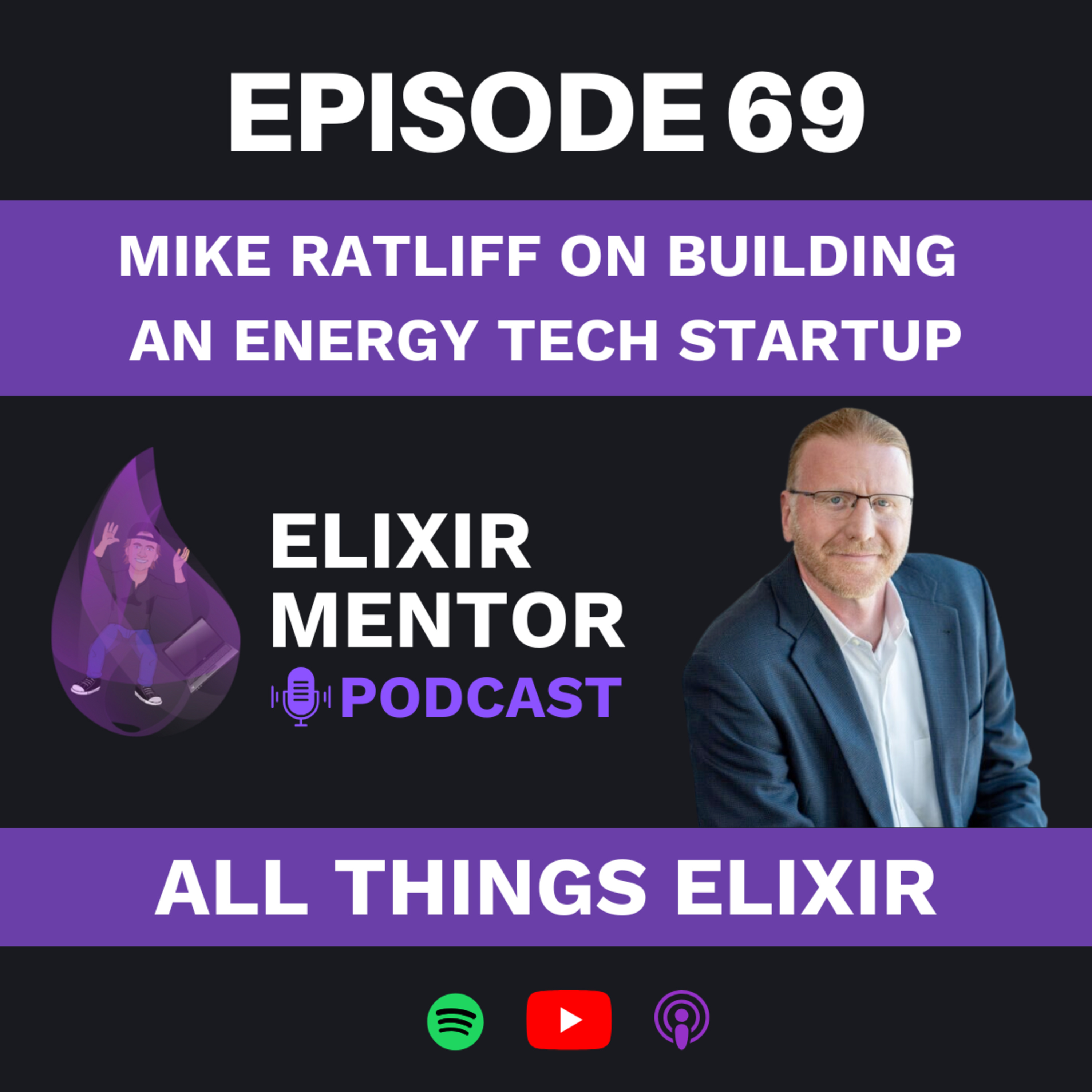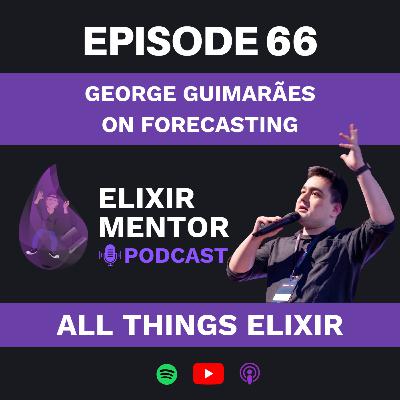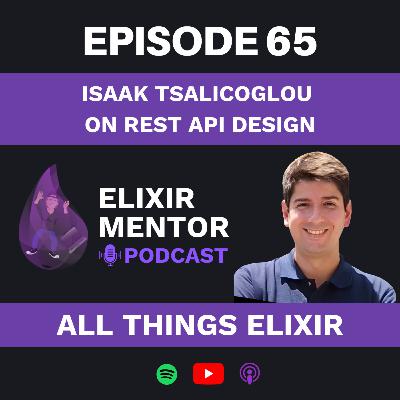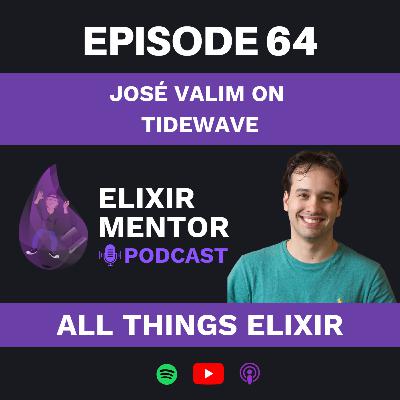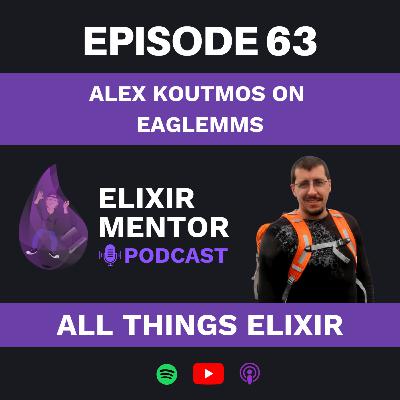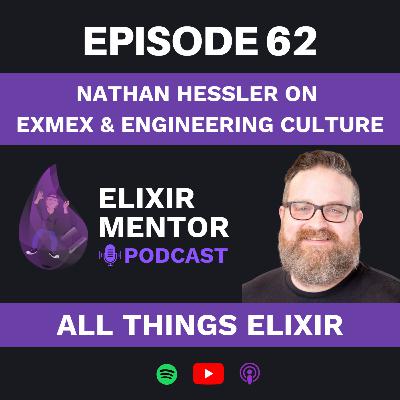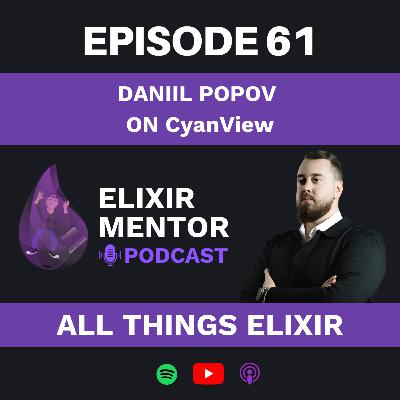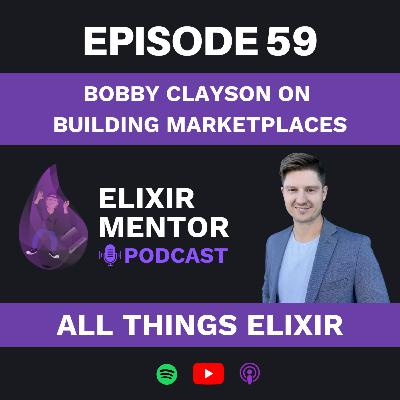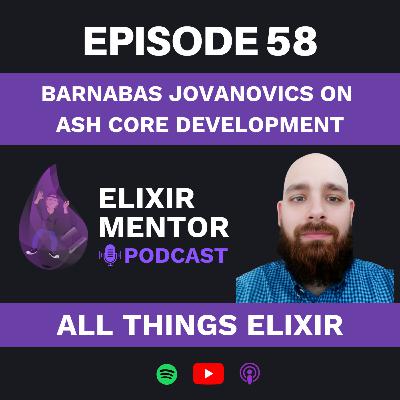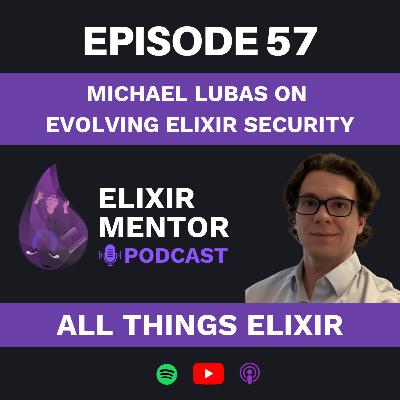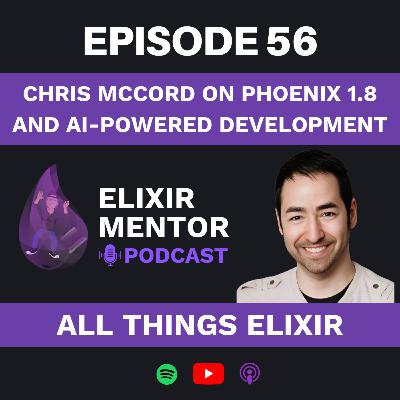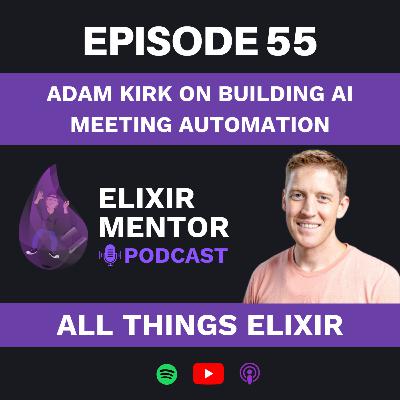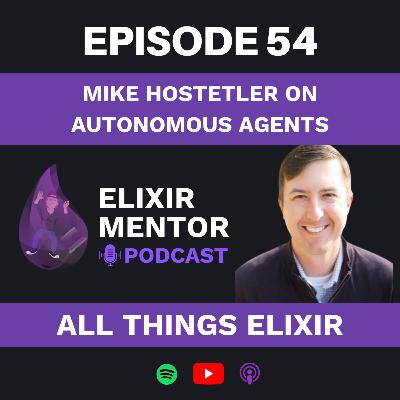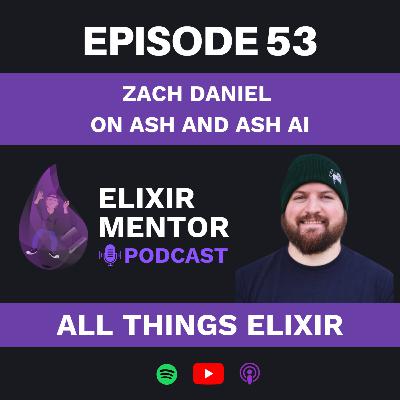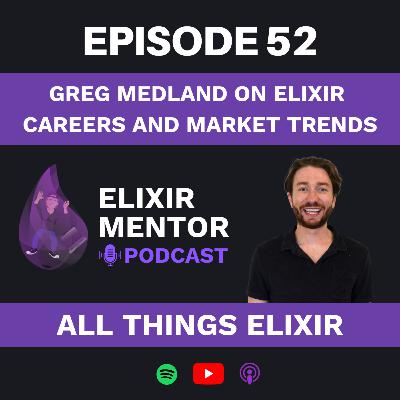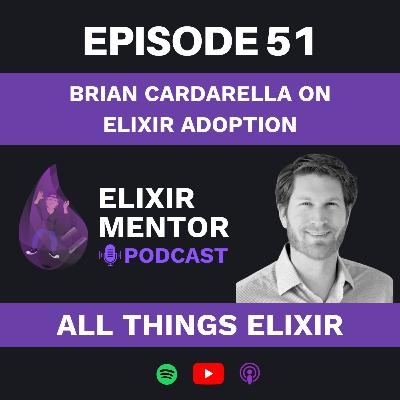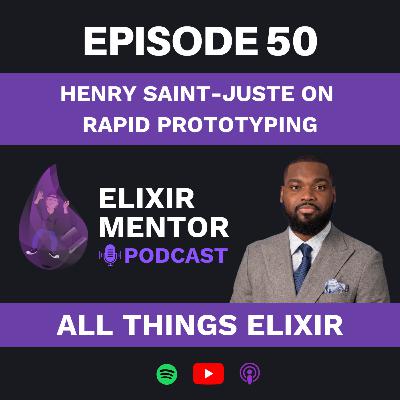Discover Elixir Mentor
Elixir Mentor

Elixir Mentor
Author: Jacob Luetzow
Subscribed: 13Played: 495Subscribe
Share
© Jacob Luetzow
Description
Welcome to the Elixir Mentor Podcast, your go-to source for All Things Elixir. This show digs into the heart of the Elixir community, featuring interviews with enthusiasts and pioneers who share their stories and innovative projects that define our ecosystem. Each episode explores groundbreaking libraries and boundary-pushing applications shaping Elixir's future. We discuss best practices, emerging trends, and the latest tools and techniques. Perfect for developers at any stage of their Elixir journey, providing insights and inspiration. Join me as we explore the world of Elixir together.
69 Episodes
Reverse
In this episode of the Elixir Mentor Podcast, I chat with Mike Ratliff, a 30-year tech veteran and CTO currently building an energy tech startup. Mike shares his path from Ruby threading nightmares to leading 20-engineer Elixir teams, and how discovering the BEAM transformed his approach to building 24/7 grid systems.We dig into the technical challenges of power grid software, including distributed energy resource management, solar intermittency, and why utilities remain cautious about new technology. Mike explains how his current startup is tackling transmission interconnection problems using Elixir, and his plans to incorporate AI agents through the Jido framework.The conversation shifts to how AI is reshaping development teams and startup economics. Mike makes a compelling case for small, elite teams over large engineering organizations, sharing his philosophy on profit per headcount and why he believes we'll see one-person unicorn companies emerge. We discuss rethinking technical interviews for the LLM era, the Ash framework in production, and why great engineers become even greater with AI tools.Mike wraps up with hard-won startup wisdom: build painkillers not vitamins, learn to tell stories that move people, and understand that nobody buys on facts alone. Whether you're building energy infrastructure or SaaS products, this conversation offers practical perspective on scaling with small teams.Connect with Mike:- LinkedIn: https://www.linkedin.com/in/mike-ratliff-3096571/Sponsors:- Paraxial.io: https://paraxial.io- Jido Discord: https://agentjido.xyz/discordSUPPORT ELIXIR MENTOR- Elixir Mentor: https://elixirmentor.com/?utm_source=elixir-mentor
In this episode of the Elixir Mentor Podcast, I chat with Coby Benveniste and Daniel Garcia-Shulman from MarkeTeam.ai about building intelligent AI marketing agents with Elixir. They share their experience migrating from Python and React to a full Elixir and LiveView stack, and explain why the BEAM VM is ideal for powering autonomous agent workflows.Coby and Daniel explain their approach to agent architecture, including why they chose gen state machine over gen server for managing agent state machines. They walk through the ReAct pattern (reasoning, actions, observations) and how it maps naturally to Erlang's state machine behaviors. The conversation covers their custom marketing strategy LLM, how they use RAG patterns for brand context, and why specialized agents outperform single all-purpose agents.We explore the technical details of their stack, including how they handle DevOps without a dedicated team using mix release, their use of Fun with Flags for feature flagging, and how Broadway and Oban power their data pipelines. The discussion also covers practical workflows with Claude Code, context management using Beads, and the usage rules library for better LLM documentation.The episode wraps up with insights on hiring Elixir developers, the emerging field of AEO (Answer Engine Optimization), and advice for developers learning Elixir with LLM assistance. Whether you're building AI agents, exploring marketing automation, or curious about advanced Elixir patterns, this conversation offers practical insights from engineers shipping production AI systems.Resources Mentioned:- MarkeTeam AI: https://www.marketeam.ai- Beads (Claude Code context tool): https://github.com/steveyegge/beadsConnect with Coby & Daniel:- Coby: https://www.linkedin.com/in/coby-benveniste/- Daniel: https://www.linkedin.com/in/danielegsh/SUPPORT ELIXIR MENTOR- Elixir Mentor: https://elixirmentor.com
Mikh Ahmed joins me to talk about SWARMMO, a massively multiplayer online browser game he's building entirely with Elixir and Godot. After experiencing burnout from AWS Lambda and serverless tooling at a Canadian fintech startup, Mikh discovered Elixir and realized it was exactly what he'd been looking for to build his dream game project.We explore how the BEAM's actor model maps perfectly to game architecture, with individual player processes, hierarchical AI units that form squads and platoons, and a simulation where NPCs actively compete for territory. Mikh shares his experience going from zero Elixir knowledge to building a game server that can handle a thousand concurrent AI units while using only 4GB of RAM and 50% CPU.The conversation covers the realities of indie game development: failed crowdfunding campaigns that led to private support, the challenge of marketing when you'd rather be coding, and plans for a Steam release and version 1.0 launch. We also discuss the potential for LLM-powered NPC personalities, why minimal dependencies matter, and how game design psychology from board games applies to digital experiences.Connect with Mikh:- X: https://x.com/SWARMMOOFFICIAL- SWARMMO: https://swarmmo.games/?lang=enSUPPORT ELIXIR MENTOR- Elixir Mentor: https://elixirmentor.com/?utm_source=elixir-mentor
In this episode of the Elixir Mentor Podcast, I chat with George Guimarães about Soothsayer, his time series forecasting library inspired by NeuralProphet and built on Axon and NX for business data analysis.We explore how Soothsayer decomposes business data into seasonal components, handles holidays as special events, and uses neural networks to model nonlinear patterns. George explains why Elixir's ecosystem with NX, Axon, and Bumblebee provides unique advantages for machine learning workflows, allowing you to run models directly in your supervision tree without external infrastructure.The conversation expands into why Elixir is particularly well-suited for AI agent development. George shares insights from his current work building agentic commerce solutions, where the BEAM's actor model, fault tolerance, and message passing provide battle-tested patterns that other ecosystems are now trying to replicate for LLM workflows. We also discuss AEO (Agent Engine Optimization) as the new SEO, and how websites will evolve to serve both human and agent visitors.Whether you're interested in time series forecasting, building AI-powered applications in Elixir, or understanding why the BEAM's concurrency model is perfect for the agentic future, this conversation offers valuable perspective from an Elixir community OG.Resources Mentioned:- Soothsayer: https://github.com/georgeguimaraes/soothsayerConnect with George:- X: https://x.com/georgeguimaraes- Website: https://georgeguimaraes.comSUPPORT ELIXIR MENTOR- Elixir Mentor: https://elixirmentor.com/?utm_source=elixir-mentor
In this episode of the Elixir Mentor Podcast, I chat with Isaak Tsalicoglou, author of Elixir Software Engineering. Isaak shares hard-won lessons from building production Elixir API clients, covering validation strategies, error handling approaches, authentication flows, and architectural patterns that actually work in the real world.We explore Isaak's journey back into programming through building internal tools for his family's industrial equipment business, and how that led to writing a comprehensive guide on REST API client development. He explains his approach to request validation, why he ultimately decided against using Ecto schemas for API responses, and the importance of resisting unnecessary complexity in software architecture.The conversation covers practical API design topics including how to structure clean RESTful routes, avoiding tight coupling between APIs and UIs, and finding the right balance between over-serving and under-serving data. Isaak also shares his thoughts on LLM-assisted development, explaining why he prefers using AI as a code reviewer rather than fully automated coding, and discusses his self-hosting infrastructure setup for privacy-conscious applications.This episode offers valuable insights for anyone building API clients in Elixir or thinking critically about software architecture decisions and their long-term implications.Resources Mentioned:- Elixir Software Engineering: https://leanpub.com/elixir-software-engineeringConnect with Isaak:- X: https://x.com/realMrLaminar- LinkTree: https://linktr.ee/tisaakxSUPPORT ELIXIR MENTOR- Elixir Mentor: https://elixirmentor.com/?utm_source=elixir-mentor
In this episode of the Elixir Mentor Podcast, I chat with Elixir creator José Valim about Tidewave, the AI coding agent that lives inside your web framework. José shares the journey from falling in love with MCP to discovering its limitations, and how Tidewave solves the copy-paste problem that plagues AI-assisted development.We explore how Tidewave integrates directly with your browser to eliminate tedious workflows, automatically detecting exceptions and validating changes without manual intervention. José explains why the tool now supports Phoenix, Rails, Django, FastAPI, Flask, and Next.js, and how building one feature benefits all frameworks simultaneously. The conversation covers prompting strategies, context management, and the unique challenges of building Tidewave with Tidewave.José offers candid insights on why MCP has fundamental limitations for user experience, the security concerns around AI agents, and why Elixir's message-passing architecture makes it ideal for building agentic systems. We discuss the evolving type system in Elixir, code review workflows with AI, and the upcoming Tidewave features including multi-element inspection and symbol search.The episode concludes with José's perspective on transitioning from open source maintainer to product owner, collecting user feedback through Discord, and exciting developments with Tauri for building desktop applications with Elixir. This conversation provides valuable insights for developers interested in AI-powered tooling and the future of web development.Resources Mentioned:- Code Benchmark: https://github.com/Tencent-Hunyuan/AutoCodeBenchmarkConnect with José:- X: https://x.com/josevalim- Tidewave: https://tidewave.ai- Dashbit: https://dashbit.coSUPPORT ELIXIR MENTOR- Elixir Mentor: https://elixirmentor.com
In this episode, I chat with Alex Koutmos, author of Elixir Patterns and creator of numerous open source libraries, about building EagleMMS—a SaaS platform helping collision repair shops accurately calculate consumable costs for vehicle repairs. Alex shares his journey from two failed startups to building a profitable business with nearly a thousand customers.We discuss the outdated methods insurance companies use to calculate repair costs, the brutal reality of door-to-door sales, and how Alex's brother (a licensed auto body technician and appraiser) became his co-founder and sales partner. Alex explains why customer support load is heavier than expected when dealing with insurance company pushback and how they coach shops through negotiations.On the technical side, Alex walks through his evolution from a Vue SPA to a full LiveView application, building PWAs that work seamlessly on mobile, and why Elixir has never been a bottleneck for his business needs. We cover ETS caching strategies for performance, database backup lessons learned the hard way, and why he refuses to do standups. Alex also previews his upcoming books on financial analytics with Explorer and Scholar, plus a Nerves book entering beta soon.Connect with Alex:- X: https://x.com/akoutmos- Books: https://akoutmos.com/top/books/- EagleMMS: https://eaglemms.com/SUPPORT ELIXIR MENTOR- Elixir Mentor: https://elixirmentor.com
In this episode of the Elixir Mentor Podcast, I chat with Nathan Hessler, an Elixir developer and organizer of the ExMex conference in Austin. Nathan shares his experience launching a successful regional conference just two weeks prior, offering invaluable insights for anyone considering organizing their own tech event.We explore the intricate logistics of conference planning, from choosing the perfect venue to managing sponsorships and hidden costs. Nathan reveals why he opted for a single-track format at Capital Factory, how he approached speaker selection to promote new voices in the community, and the creative process behind ExMex's clever Texas-themed naming convention.Our conversation shifts to Nathan's decade of experience in engineering leadership, where he shares wisdom on building healthy engineering cultures. We discuss the critical soft skills needed for technical management, strategies for creating trust and respect within teams, and how to foster environments where constructive debate thrives. Nathan emphasizes that the best engineering teams aren't built on shared hobbies but on mutual respect and the ability to engage in productive disagreement.The episode concludes with practical advice for aspiring conference organizers, including the importance of talking to other organizers, loving your speakers, and celebrating the unique character of your location. Nathan also reveals plans for RBQ, his upcoming Ruby conference scheduled for March 2025, continuing his mission to strengthen the Austin tech community through meaningful in-person connections.Resources Mentioned:- ExMex Conference: https://exmexconf.com/- RBQ Conference: Upcoming Ruby conference in Austin (March 2025)- Capital Factory: Conference venue in AustinConnect with Nathan:- LinkedIn: https://www.linkedin.com/in/nathanhessler/- Website: https://hesslerconsulting.com/- ExMex: https://exmexconf.com/SUPPORT ELIXIR MENTOR- Elixir Mentor: https://elixirmentor.com/?utm_source=elixir-mentor- Discord: https://elixirmentor.com/discord
In this episode of the Elixir Mentor Podcast, I sit down with Daniil Popov to discuss CyanView, a system that brings Phoenix LiveView to embedded devices for professional video production. We examine the challenges of creating unified camera control systems that work across 27+ different protocols from manufacturers like Sony, Canon, and RED.Daniil shares how CyanView enables real-time camera shading for major broadcast events including the Olympics, Super Bowl, and Le Mans races. We discuss the technical implementation of LiveView on resource-constrained 32-bit ARM processors, managing distributed systems with MQTT, and solving complex problems like socket reconnection and performance optimization on embedded devices.Our conversation covers the unique advantages of using Elixir for embedded systems, from binary pattern matching for protocol reverse engineering to supervision trees for fault tolerance. Daniil explains how they utilize nearly 80% of Elixir's capabilities—far more than typical web applications—including NIFs for C integration, custom FPGA modules for color correction, and practical approaches to creating responsive interfaces on limited hardware.The episode wraps up with discussion of the future of camera control technology, the challenges of working with proprietary protocols, and why Elixir's actor model and distributed computing capabilities make it uniquely suited for this complex problem space. Whether you're interested in embedded systems, LiveView applications, or the intersection of hardware and software, this conversation offers valuable perspectives on pushing Elixir beyond traditional web development.Resources Mentioned:- CyanView:https://cyanview.com/- Phoenix LiveView Documentation- MQTT Protocol and Mosquitto- Burrito and Tauri for Binary CompilationConnect with Daniil:- X/Twitter:https://x.com/mrpopov_comSUPPORT ELIXIR MENTOR- Elixir Mentor:https://elixirmentor.com/?utm_source=elixir-mentor
In this episode of the Elixir Mentor Podcast, I chat with Mike Hostetler, creator of the Jido agent framework and ReqLLM library. Mike shares his journey building a unified interface for calling multiple LLM providers in Elixir, addressing the frustrating inconsistencies between different AI APIs.We dive into ReqLLM's architecture, exploring how it normalizes the differences between providers like OpenAI, Anthropic, Google, and more. Mike explains his decision to build a lightweight alternative to existing libraries like Instructor and LangChain, creating something that handles streaming, tool calling, and structured outputs with simple one-line function calls.Mike demonstrates the library live, showing how to test 112+ models across different providers, handle streaming responses, and calculate token usage costs. We discuss the challenges of supporting multiple providers, from handling deprecated models to dealing with provider-specific headers and parameter variations.The conversation also covers Jido's evolution, the upcoming Phoenix dashboard for managing agents, and Mike's vision for hierarchical agent systems in Elixir. We explore how ReqLLM fits into the broader Elixir AI ecosystem and discuss future plans for local LLM support and integration with frameworks like Ash.Resources Mentioned:- ReqLLM GitHub: https://github.com/agentjido/req_llm- Jido Framework: https://agentjido.xyz- models.dev: https://models.devConnect with Mike:- GitHub: https://github.com/agentjido- Website: https://mike-hostetler.comSUPPORT ELIXIR MENTOR- Elixir Mentor: https://elixirmentor.com
In this episode of the Elixir Mentor Podcast, I sit down with Bobby Clayson, CEO of Crofter Market, who's tackling one of America's biggest challenges: food system centralization. Bobby shares his journey from building Tax Bit in the cryptocurrency space to creating a marketplace that connects local farmers directly with consumers.We dive deep into the technical and business challenges of building a two-sided marketplace with Elixir. Bobby explains how COVID exposed critical weaknesses in our food supply chain—from beef rationing while farms had surplus livestock to the loss of 50% of American ranchers over four decades. He shares how Crofter evolved from a simple directory to a full third-party logistics operation with refrigerated delivery.The conversation covers crucial startup lessons: solving the cold start problem, building trust with non-technical farmers, knowing when to pivot, and the importance of stepping away from code as a technical founder. Bobby offers candid advice about fundraising, hiring in the Elixir ecosystem, and why passion for your problem matters more than your idea. He emphasizes how functional programming naturally aligns with distributed systems and why Elixir's fault tolerance makes it perfect for marketplace infrastructure.This episode provides valuable insights for anyone building marketplaces, working with physical logistics, or transitioning from technical to leadership roles. Bobby's story demonstrates how technology can address real-world problems while supporting local farmers and improving public health through better food access.Resources Mentioned:- Crofter Market: https://crofter.com- The Cold Start Problem by Andrew Chen- Platform RevolutionConnect with Bobby:- LinkedIn: https://www.linkedin.com/in/bobbyclayson/SUPPORT ELIXIR MENTOR- Elixir Mentor: https://elixirmentor.com
In this episode of the Elixir Mentor Podcast, I sit down with Barnabas Jovanovics, a core engineer on the Ash framework team. Barnabas shares his unique journey from working as an electrician and automation engineer to becoming a key contributor to one of Elixir's most powerful frameworks.We explore how Barnabas discovered Ash while building a booking platform, initially skeptical but quickly becoming convinced by its power. He discusses his major contributions including Ash RBAC for simplified role-based access control and GraphQL subscriptions, as well as his current work on a Discord bot framework that leverages Ash's architecture patterns.Our conversation covers the philosophy of open source development, the challenges of maintaining large projects, and the exciting new Ash TypeScript integration that just launched. This feature automatically generates type-safe TypeScript client code from your Ash resources, supporting both fetch and Phoenix channels for real-time communication.We also discuss valuable perspectives on the Elixir community, conference experiences at Goatmire and Alchemy Conf, and practical advice for developers navigating the rapidly evolving landscape of AI-assisted programming. Whether you're new to Ash or an experienced user, this conversation provides valuable insights into the framework's architecture and future direction.Resources Mentioned:- Ash Framework: https://ash-hq.org/Connect with Barnabas:- X: https://x.com/barnabasMJSUPPORT ELIXIR MENTOR- Elixir Mentor: https://elixirmentor.com
In this episode of the Elixir Mentor Podcast, I welcome back Michael Lubas, founder of Paraxial.io, where he's building comprehensive security tooling specifically designed for the Elixir ecosystem. We explore how AI-generated code is impacting application security and why traditional scanning tools aren't catching critical vulnerabilities.Michael shares his experience with the most common security mistakes in Elixir projects, including binary deserialization exploits that can lead to remote code execution. We discuss how Phoenix 1.8's improved security documentation helps developers, the rise of organized ransomware attacks, and why security scanning is more crucial than ever with AI-assisted development becoming mainstream.Our conversation covers the challenges of enterprise security tooling, the differences between Rails and Elixir security patterns, and how Paraxial 3.0 is addressing the unique needs of Elixir developers. Michael explains why most enterprise security tools fail developers and how Paraxial takes a developer-first approach to vulnerability detection and remediation.We also discuss the future of AI in software development, identity verification challenges in an age of deepfakes, and the evolving hiring landscape for developers. This conversation provides essential context for anyone building production Elixir applications or concerned about security in the age of AI-generated code.Resources Mentioned:- Paraxial.io Security Platform: https://paraxial.io/- Phoenix Security Documentation: https://hexdocs.pm/phoenix/security.htmlConnect with Michael Lubas:- X/Twitter: https://x.com/paraxialio- LinkedIn: https://www.linkedin.com/in/michaellubas/SUPPORT ELIXIR MENTOR- Elixir Mentor: https://elixirmentor.com
In this episode of the Elixir Mentor Podcast, I chat with Chris McCord, creator of Phoenix Framework and LiveView. We dive deep into Phoenix 1.8's groundbreaking AI features, including the revolutionary AGENTS.md file that's transforming how developers work with LLMs in their Elixir applications.Chris shares the fascinating evolution from Phoenix channels to LiveView, explaining how his early experiments with real-time Rails applications led to creating the framework that powers some of today's most ambitious web applications. We explore Phoenix.new, the browser-based development platform that lets anyone build Elixir apps without installing anything locally, and discuss how Tidewave MCP brings intelligent AI assistance directly into your development workflow.Our conversation reveals why Elixir's concurrency model and OTP primitives make it the perfect platform for building AI agents, with Chris explaining how gen servers naturally solve the complex state management and routing problems that other ecosystems struggle with. He provides valuable insights on using LLMs effectively in development, from avoiding common pitfalls to leveraging AI for code porting and debugging.The episode concludes with Chris's thoughts on open source sustainability, the importance of community culture, and practical advice for developers looking to level up their skills with AI-assisted development. This conversation offers essential perspective for anyone working with Elixir or considering how AI will shape the future of software development.Resources Mentioned:- Phoenix Framework: https://phoenixframework.org/- Metaprogramming Elixir book- Phoenix.new - Browser-based development platform- Tidewave MCP - Local AI development integrationConnect with Chris:- Website: https://chrismccord.com/- LinkedIn: https://www.linkedin.com/in/chris-mccord-98b47a37/SUPPORT ELIXIR MENTOR- Elixir Mentor: https://elixirmentor.com
In this episode of the Elixir Mentor Podcast, I chat with Adam Kirk, CTO and co-founder of Jump, where they're building AI-powered meeting intelligence for financial advisors. We dive deep into scaling Elixir applications, managing LiveView at thousands of concurrent connections, and building high-performance teams in competitive markets.Adam shares his fascinating journey from PHP and Rails to Elixir, explaining how Jump pivoted from sales automation to financial advisor tools and found explosive product-market fit. We explore the technical challenges of real-time meeting processing, AI cost optimization, and the unique compliance requirements of the financial sector.Our conversation covers Jump's innovative hiring philosophy, including their distinctive approach of 30-minute coding assessments followed by paid trial weeks. Adam explains how they've successfully hired 40+ engineers, many learning Elixir on the job, while maintaining a strong culture of full-stack ownership and work-life balance.We also discuss practical aspects of scaling with LiveView, handling WebSocket reconnections gracefully, and why they chose Oban over traditional GenServer patterns in their Kubernetes environment. This episode provides valuable insights for anyone building AI-powered applications, scaling engineering teams, or navigating the challenges of startup growth.Resources Mentioned:- Jump: https://jumpapp.com/- Jump Careers: https://careers.jumpapp.com/- Adam on X: https://x.com/atomkirkSUPPORT ELIXIR MENTOR- Elixir Mentor: https://elixirmentor.com- Recruitment Services: https://elixirmentor.com/?utm_source=elixir-mentor
In this episode of the Elixir Mentor Podcast, I sit down with Mike Hostetler, creator of Jido, a powerful framework for building autonomous AI agent systems in Elixir. We explore why Elixir's actor model and OTP make it the ideal platform for creating massive agent swarms.Mike shares his vision of "10,000 agents per human" and explains how Jido's architecture leverages Elixir's strengths to build scalable, distributed agent systems. We dive deep into the framework's core components including actions (atomic units of work), signals (messaging backbone), and how agents can spawn sub-agents in supervision trees. The conversation covers practical applications, from Discord bots to job board automation.Our discussion reveals fascinating insights about the future of software development, where traditional coding languages may need to evolve for the agent-driven world. Mike explains his design philosophy of keeping LLMs separate from the core framework, allowing for both AI-powered and traditional NPC-style agents to coexist efficiently.This episode provides valuable perspective for developers interested in building autonomous systems, understanding distributed architecture, and preparing for the next evolution in software development where agents become integral to our development workflow.**Resources Mentioned:**- Jido Framework: https://github.com/agentjido- Agent Jido: https://agentjido.xyz- Mike's Website: https://mike-hostetler.com/**Connect with Mike:**- X/Twitter: @mikehostetlerSUPPORT ELIXIR MENTOR- Elixir Mentor: https://elixirmentor.com
In this episode of the Elixir Mentor Podcast, I sit down with Zach Daniel, the brilliant creator of Ash Framework, for a fascinating discussion about the intersection of AI and application development. We dive deep into LLM workflows, explore the revolutionary usage rules system, and get an exclusive look at Ash AI - the comprehensive toolkit that's changing how we integrate AI capabilities into Elixir applications.Zach shares his insights on effective LLM usage patterns, from vibe coding workflows to production-ready AI integrations. We explore the groundbreaking usage rules system that allows library authors to provide LLM-specific guidance, making AI assistance dramatically more effective for framework users. The conversation covers Ash AI's powerful features including automated chatbot generation, prompt-backed actions, and seamless tool integration that lets you build AI-enabled applications with minimal effort.Our discussion also touches on the challenges of scaling open source communities, the future of solo entrepreneurship in the AI era, and how tools like Deep Wiki are creating surprisingly accurate AI-generated documentation. Zach provides valuable perspective on managing large open source projects while maintaining code quality and community engagement.This episode offers essential insights for developers interested in leveraging AI tools effectively, understanding modern framework design, and building robust applications with Elixir and Ash. Whether you're exploring AI integration or looking to understand cutting-edge development workflows, this conversation provides practical wisdom and forward-thinking perspectives.Resources Mentioned:- Ash Framework: https://ash-hq.org/- Ash Framework Book: https://pragprog.com/titles/ldash/ash-framework/- Usage Rules: https://hexdocs.pm/usage_rules/- Deep Wiki: https://deepwiki.org/Connect with Zach:- LinkedIn: https://www.linkedin.com/in/zachdaniel/- Substack: https://www.zachdaniel.dev/- GitHub: https://github.com/zachdanielSUPPORT ELIXIR MENTOR- Elixir Mentor: https://elixirmentor.com
In this episode of the Elixir Mentor Podcast, I welcome back Greg Medland, a recruiter who specializes in connecting talented developers with companies seeking expertise in the Elixir ecosystem. We dive deep into the current state of the Elixir job market and explore what developers can expect in 2025.Greg shares valuable insights on how the market has evolved since the post-COVID correction, revealing encouraging signs of recovery and continued Elixir adoption. We discuss the most in-demand skills including Ash Framework experience, full-stack capabilities with React, and AI/ML integration. The conversation explores how companies like Apple, BBC, and numerous startups are successfully leveraging Elixir at scale.We tackle the elephant in the room - AI's impact on developer roles. Greg provides a balanced perspective on how AI tools are changing the hiring landscape, what employers expect regarding AI proficiency, and how developers can leverage these tools while maintaining their value. He emphasizes the importance of using AI as a productivity enhancer rather than a replacement for critical thinking.The episode concludes with practical career advice including resume tips, interview strategies, and how to stand out in a competitive market. Greg shares his unique perspective from reviewing more Elixir developer resumes than perhaps anyone else, offering actionable insights for developers at all levels.Resources Mentioned:- Elixir Remote US Jobs Channel (Elixir Slack)- I Ask.ai: https://iask.aiConnect with Greg:- LinkedIn: https://www.linkedin.com/in/gregmedlandg2/SUPPORT ELIXIR MENTOR- Elixir Mentor: https://elixirmentor.com
In this comprehensive episode of the Elixir Mentor Podcast, I sit down with Brian Cardarella, CEO of DockYard, to tackle one of the most critical topics facing our community: Elixir adoption. We dive deep into the challenges and opportunities that shape how developers and companies discover and embrace Elixir.Brian shares his extensive experience from the consulting world, discussing everything from the changing conference landscape and social media fragmentation to the existential questions around AI's impact on programming languages. We explore why traditional adoption pathways have shifted, the role of LLMs in shaping developer choices, and practical strategies for convincing teams to adopt Elixir in both startup and enterprise environments.Our conversation covers the technical barriers newcomers face with OTP, the importance of community building, and the economic realities affecting the entire tech industry. Brian provides candid insights about running a consultancy during market downturns, the influence of private equity, and why Elixir's "makes hard things easy" philosophy sometimes struggles with the "easy things" developers expect.We also tackle community-submitted questions about migration strategies, tooling gaps, type systems, and the future of Live View Native. This episode offers both tactical advice for developers and strategic insights for technical leaders considering Elixir adoption.Resources Mentioned:- Elixir Outreach Stipend Program: https://elixir-lang.org/blog/2025/06/02/elixir-outreach-stipend-for-speakers/- Conference opportunities list by Dave Erensson:https://www.codosaur.us/speaking/cfps-ending-soonConnect with Brian:- X/Twitter: https://x.com/bcardarella/- DockYard: https://dockyard.com/SUPPORT ELIXIR MENTOR- Elixir Mentor: https://elixirmentor.com
In this episode of the Elixir Mentor Podcast, I sit down with Henry Saint-Juste, Solutions Architect at NetJets, to explore his philosophy of rapid prototyping and moving fast to validate ideas before committing to tech stacks. Henry shares his unique approach to staying 2-3 sprints ahead of engineering teams and building proof of concepts that drive real business decisions.We dive deep into Henry's experience building NetJets' mobile application using a "code once, deploy anywhere" strategy with React Native and Expo. Henry explains how he evaluates cross-platform frameworks and why React Native succeeded where other solutions like Flutter and Cordova fell short. Our conversation covers his methodology for rapid prototyping, platform engineering approaches, and the importance of getting user feedback loops as quickly as possible.Henry also shares his experience working with Elixir at a previous healthcare startup, his thoughts on automation and "speed of thought" development, and some fascinating insights about his unique perks working at NetJets (hint: private jets are involved). We explore modern deployment strategies, the evolving landscape of DevOps tools, and wrap up with predictions about AI's impact on software engineering teams.This conversation offers valuable insights for anyone interested in rapid prototyping methodologies, cross-platform mobile development, and building MVPs that actually provide meaningful data for product decisions.Connect with Henry:- LinkedIn: https://www.linkedin.com/in/hberson/SUPPORT ELIXIR MENTOR- Elixir Mentor: https://elixirmentor.com


